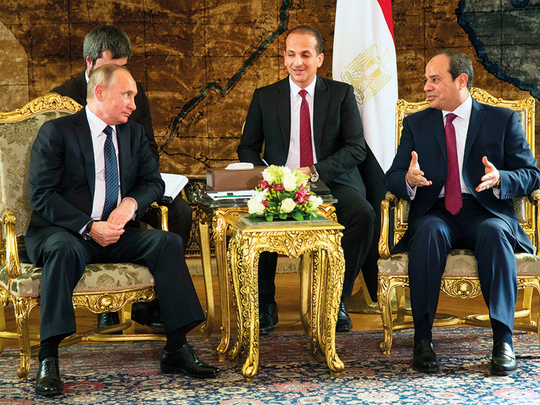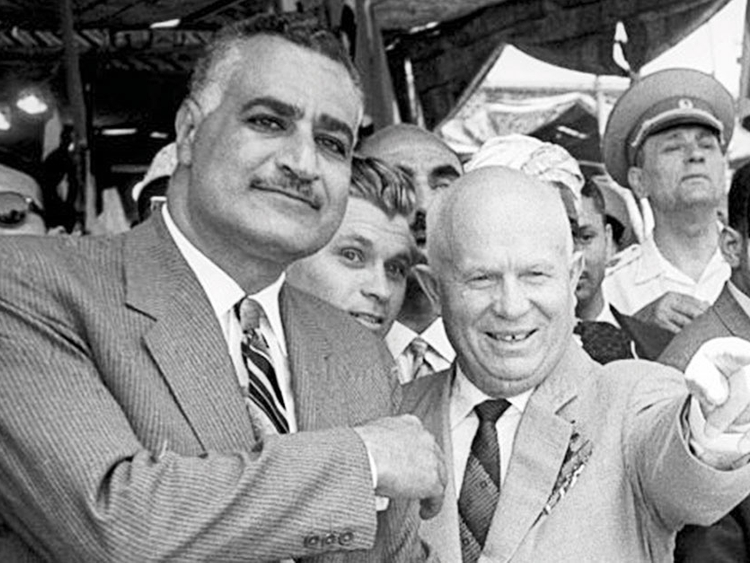
Cairo: Egypt and Russia plan to finalise on Monday a $30-billion (Dh110 billion) deal to build North Africa’s first nuclear power plant as the Kremlin moves to further expand its influence in the region.
Russian President Vladimir Putin was to arrive in Cairo to meet his Egyptian counterpart Abdul Fattah Al Sissi. The visit would witness the signing of the deal to build a nuclear plant at Al Dabaa after three years of talks, Al Sissi’s spokesman said.
The high-profile project will increase Russia’s economic presence and political influence in the region, already on the rise since Putin intervened in Syria’s war in 2015 and began playing a more active role in Libya, conflicts where the Russian leader and Al Sissi see eye to eye. His visit to Cairo comes less than two weeks after the countries said they were in talks to use each other’s military airbases.
Russia and Egypt agreed three years ago to begin work on a nuclear power project, with Russia’s state nuclear monopoly Rosatom Corp. initially expecting the deal to be sealed in early 2016. But progress was delayed after the bombing of a Russian airliner over Egypt in late 2015 in which 224 holidaymakers were killed.
Russia suspended flights to Egypt after the bombing by a local affiliate of Daesh, dealing a major blow to tourism just as the country sought to revive an economy battered by political upheaval since the 2011 uprising. Egypt has been working to improve airport security and persuade Russia to resume flights ever since.
RIA reported Russian Transport Minister Maxim Sokolov as saying on December 8 that his country was likely to discuss restoring flights during Putin’s visit, along with other topics including regional security and trade links, that the two leaders are expected to discuss.
On the eve of the visit, banners could be seen at Cairo airport pointing Aeroflot passengers in various directions.
Rosatom expects to clinch a deal to build four reactors of the Al Dabaa power plant and reach a 60-year agreement to supply nuclear fuel and ultimately decommission the plant, the company said in June. The 4,800-megawatt plant, some 130km north-west from Cairo, is estimated to cost about $30 billion and Russia is expected to provide a $25 billion loan to help finance the project.
Putin’s visit will witness the signing of document which will “give the starting signal for the Al Dabaa nuclear project,” Egypt’s state news agency MENA quoted the presidential spokesman as saying late on Saturday. Electricity Ministry spokesman Ayman Hamza said the first phase would begin production nine years after the project-launch, with the remainder coming online one or two years later.
“We have finalised technical, financial and legal aspects of the deal,” he said by telephone.
Egyptian newspapers hailed the expected nuclear deal as a historic moment for Egypt, the second-largest energy-consumer in Africa after South Africa, currently the home of the only nuclear power plant on the continent. Egypt was also the fastest growing energy market in the Middle East and Africa, according to BP Plc statistical reports.
Russia has a history of pursuing large-scale energy projects in Egypt, often as part of a broader effort to challenge US political, military and economic influence in the region. The Soviet Union helped build the Aswan High Dam in the 1960s.
Moscow was also major power in the Middle East during the Cold War, arming Arab states against Israel. Its influence waned in the 1990s with the collapse of communism leaving the US as the pre-eminent superpower in a troubled region.













